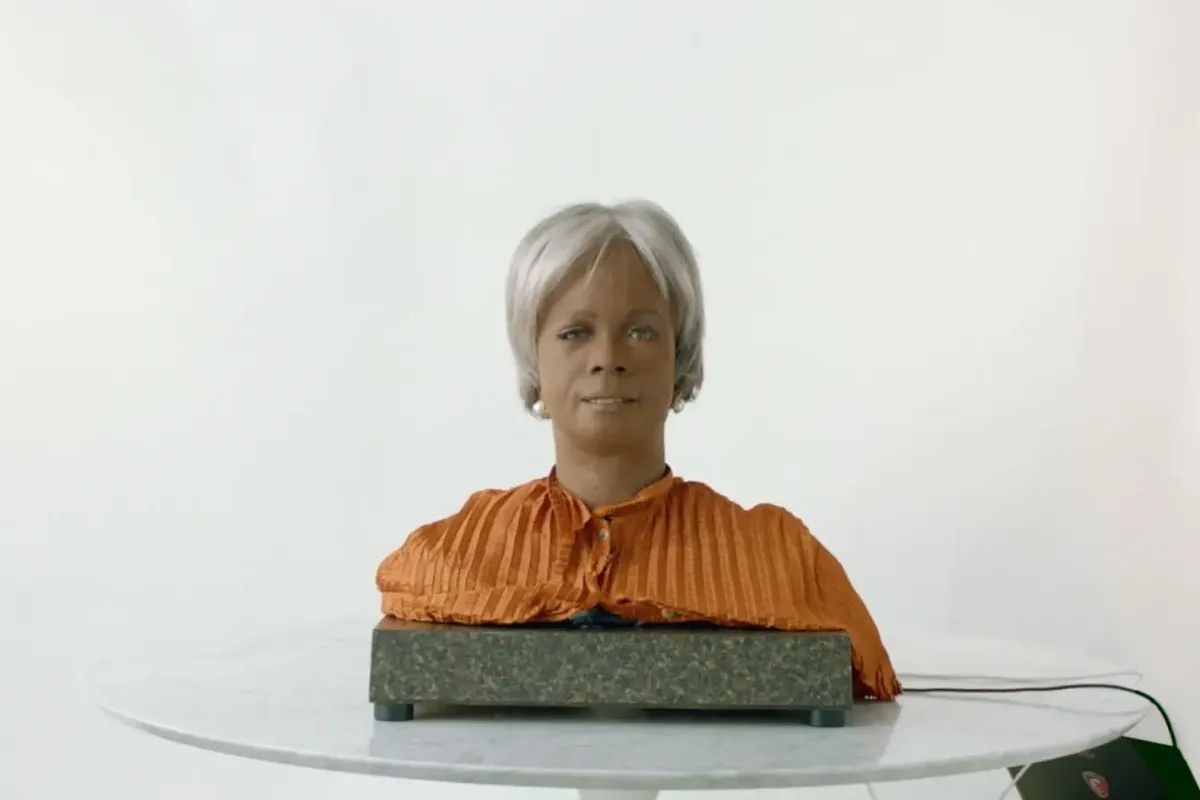
This post was written by Kylee Pena and originally appeared on the Adobe Blog on January 19th, 2024.
In an attempt to take their love story beyond “till death do us part”, Martine and Bina commission an advanced humanoid AI named Bina48 to transfer Bina’s consciousness from a human to a robot. Editor Conor McBride used several versions of Adobe Premiere Pro to portray this inquisitive film that transcends time and space.
Along with Premiere Pro, Adobe Frame.io was an integral part of the team’s editing workflow throughout the film as they used it for feedback from the director (Peter Sillen), composer (T. Griffin), graphics house, and more.
Read on below for a behind-the-scenes look into McBride’s editing process of the film.
How and where did you first learn to edit?
In 2009, I moved to New York City on a J1 visa from Ireland. It was mid-recession and I had an internship at a commercial production company. One day they asked if anyone could edit for them in-house. I pretended I had more experience than I did and spent a lot of late nights learning how to edit. Fake it ’til you make it!
How do you begin a project/set up your workspace?
Organization is key. I have my tried and tested folder structure with which I organize everything on my hard drives and then mirror in my Premiere Pro project. Then it’s a lot of watching down footage, making selects and imagining what kind of film you want to make. In the last year with the help of Ben Mercer, our additional editor, we worked as a team, mostly remotely on Premiere Productions.
Tell us about a favorite scene or moment from this project and why it stands out to you.
It’s hard to pick a favorite because there are so many. No spoilers, but there is a very sweet moment at the end of the film where our protagonists act out the fantasy vision of their sci-fi future together. I have watched it a thousand times and I can’t help but smile every time.
What were some specific post-production challenges you faced that were unique to your project? How did you go about solving them?
This is a film about a robot so this is a unique project. Ethics is always a big factor in documentaries. Every cut you make is a manipulation and you always need to have your moral compass on. It’s not a secret that you can make anyone say anything in a documentary film. With a robot’s monotonous voice that takes it to another level, I made sure that we minimized any manipulation in how we cut together what Bina48 says and how she says it.
What Adobe tools did you use on this project and why did you originally choose them? Were there any other third party tools that helped enhance your workflow?
Premiere Pro CC 2018. Premiere Pro CC 2019. Premiere Pro CC 2020…. Premiere Pro 2024. This film was many years in the making so I used a lot of Premiere Pros. I only want to work in Premiere Pro so there wasn’t a discussion! This is an archive heavy film and we also used a lot of Topaz in the finishing of this film to help with lower resolution photos and videos.
Do you use Frame.io as part of your workflow? If so, how do you use it?
When I used to type “f” into my web browser, it used to bring me to Facebook but now it brings me to Frame.io. I use it for everything and avoid Dropbox at all costs. We used it throughout the film for feedback from the director to me, from us to the composer, graphics house and anyone else.
If you could share one tip about Premiere Pro, what would it be?
Shortcuts. Use as many keyboard shortcuts as you can. The faster the editor you are, the more work you will get, and the quicker you can get out of your edit suite and live your life.
Who is your creative inspiration and why?
All my artist friends — people who think outside of the box.
What’s the toughest thing you’ve had to face in your career and how did you overcome it?
I have recently finished three feature documentaries that were all nearly 5-10 years in the making. There were times when I feared, due to powers outside of our control, that none of them would see the light of day despite all the work we put in. We were passionate about telling these stories, and despite challenges, we did everything we could to help them get to the finish line. It’s such a joy to start to see them reach the audiences they deserve. Hard work and determination pays off.
What advice do you have for aspiring filmmakers or content creators?
Fake it ’til you make it!

Share a photo of where you work. What’s your favorite thing about your workspace and why?
I love my big windows, high ceilings and being surrounded by objects that mean a lot to me.
This post was written by Kylee Pena and originally appeared on the Adobe Blog on January 19th, 2024.
Author: Sponsored Content
This article comes from No Film School and can be read on the original site.
